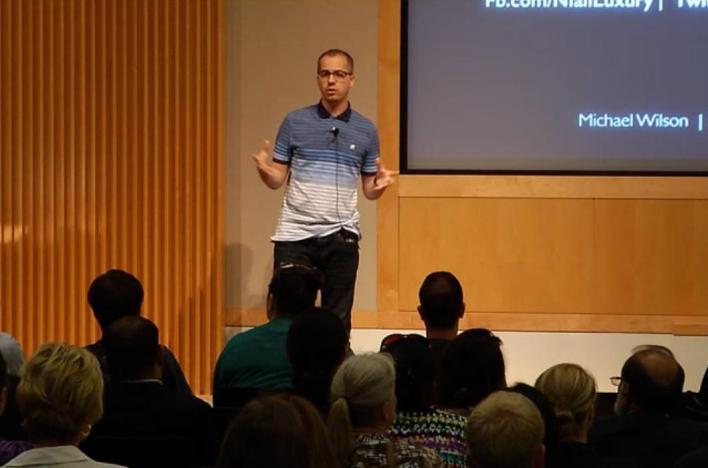This week’s 1 Million Cups at the Kauffman Foundation offered pitches for a deluxe wristwatch maker and a company that connects traveling union craftspeople with jobs at nuclear power plants.
Michael Wilson, founder of Niall, began by stating that he was “on a quest to create the next great American luxury brand,” beginning with luxury timepieces.
Niall’s debut product is the Niall One, a high-end men’s wristwatch with 93.3 percent of its components made in America. That designation is significant, Wilson said, because 60 percent of consumers in the United States and China are willing to pay 10 to 80 percent more for a luxury product made in America.
The starting price for the Niall One is $3,700. The watch’s “bold, classic design” took two years to develop, Wilson said. It includes an airlock steel construction and a Swiss movement (the only component not made in America). The Niall One is also the first luxury timepiece to incorporate Corning Gorilla Glass. Each watch is manufactured only when ordered by a customer, with delivery in two to five weeks.
To mitigate financial risk, Niall is searching for investors and selling exclusively online until suitable retail partners can be found. The company also intends to go global. “We want to expand beyond America, because you can’t rely on just one country,” Wilson said.
Other plans call for the eventual introduction of a “sister brand” of Niall wristwatches dubbed Caireen to represent “strong women,” Wilson said.
Although Niall timepieces are assembled in Kansas City, Wilson pointed out that the product’s most intricate components are made elsewhere to “a level of precision down to the micro level” that’s not yet locally achievable.
“We would like to see more people push themselves and work on the precision side of things in Kansas City,” he said.
TravelingNuker at 1 Million Cups
Next up was Christopher Baran, founder of TravelingNuker, who was making his second visit to 1 Million Cups. The company’s online platform provides scheduling and contact information for traveling workers in the unionized skilled building trades who are looking for jobs at nuclear power plants around the country.
Although TravelingNuker might seem like too much of a niche business, Baran said, one in five American homes is powered by a nuclear reactor, and more than 250,000 traveling union craftspeople are employed by them.
“Our tool is designed to be an aid for the unions,” Baran said.
The company’s revenue comes from charging “traveling nukers,” who collectively earn $13.4 billion a year, a $10 to $20 monthly subscription fee for its service. Doing the math, Baran said, TravelingNuker could potentially earn $30 million a year.
“I think we can survive on that,” he said, although the company’s platform could be expanded to assist workers in other industries.
For now, Baran said, TravelingNuker’s goal is to “promote high-paying, middle-class jobs” and “get the best work done that we can at these plants to keep electricity running.”

